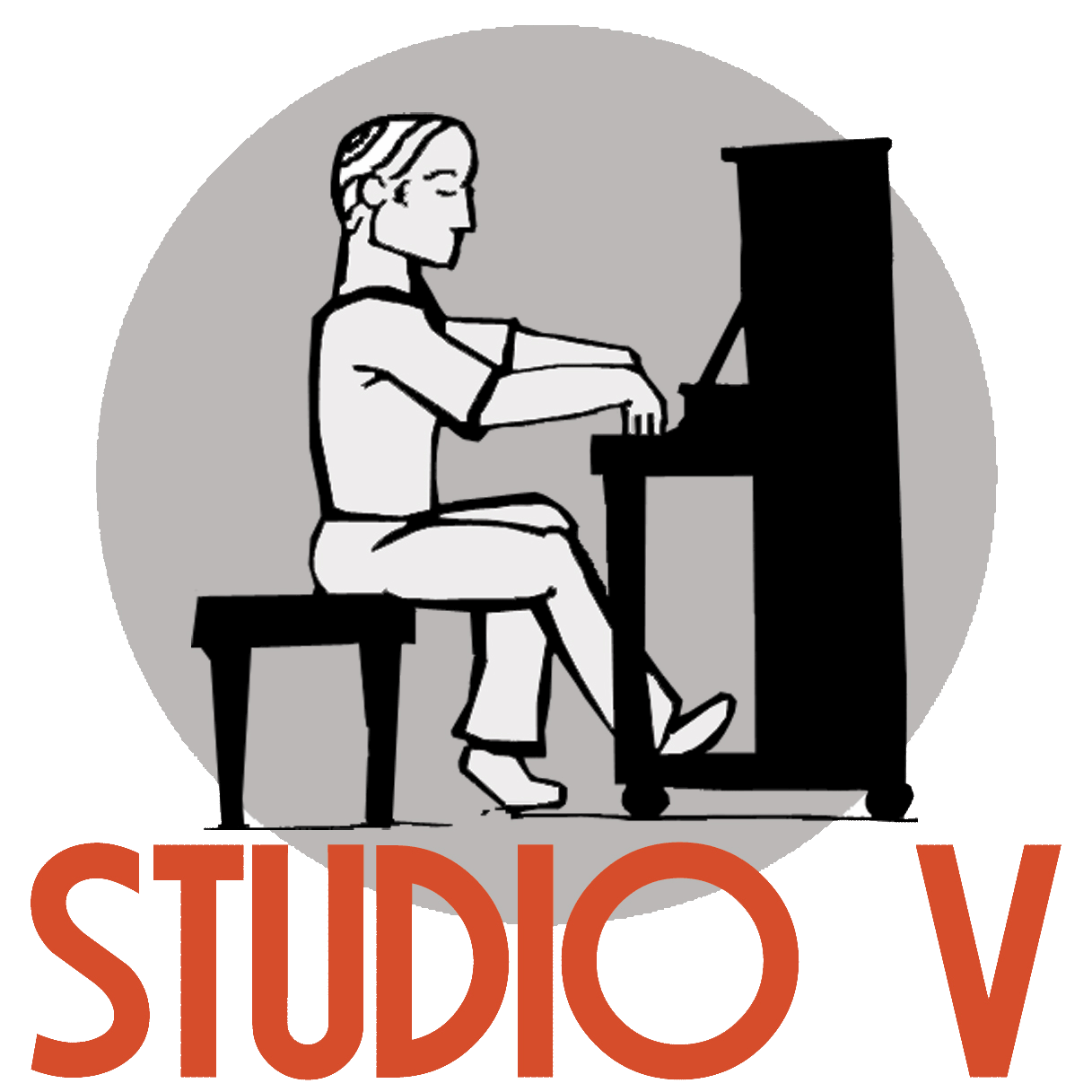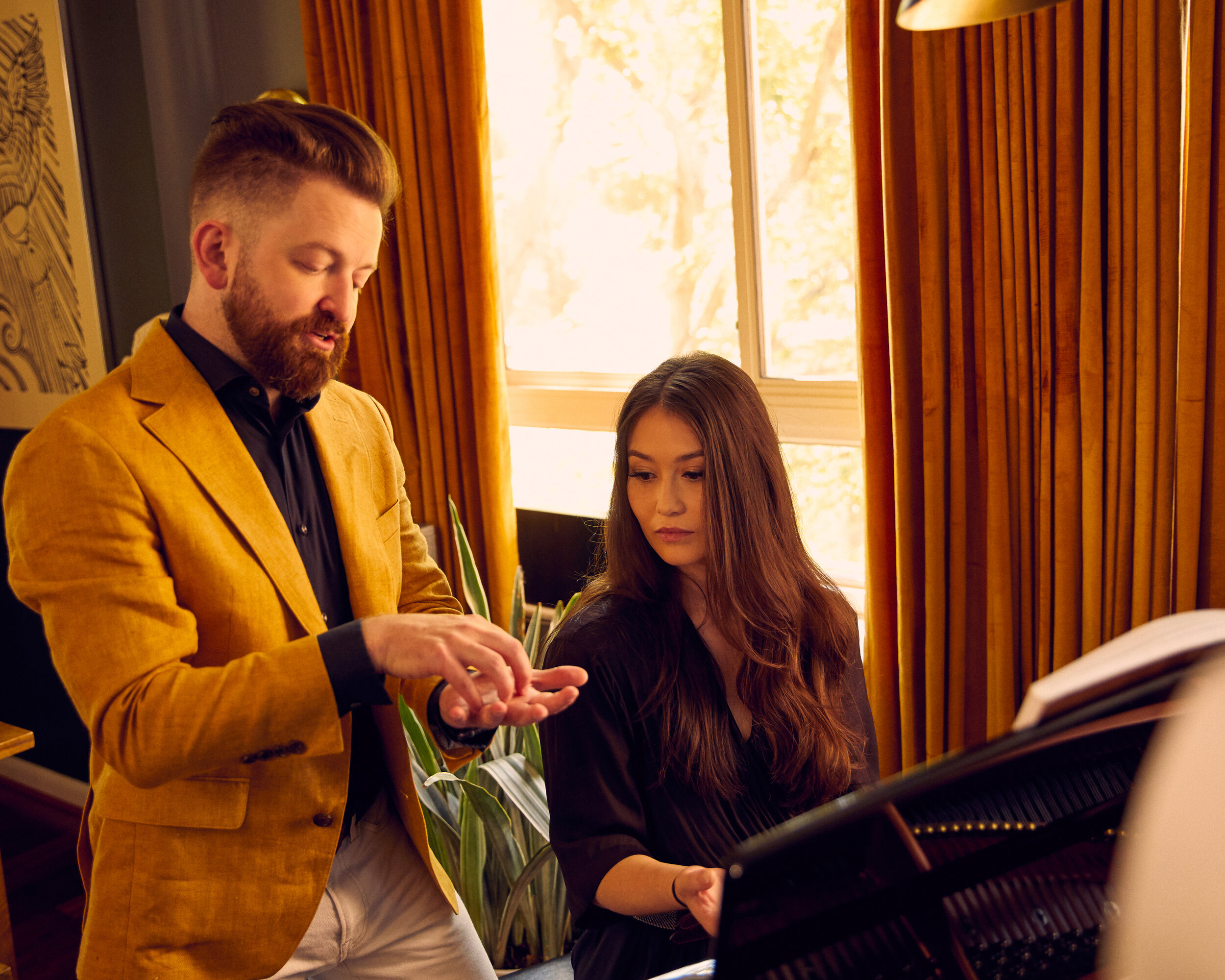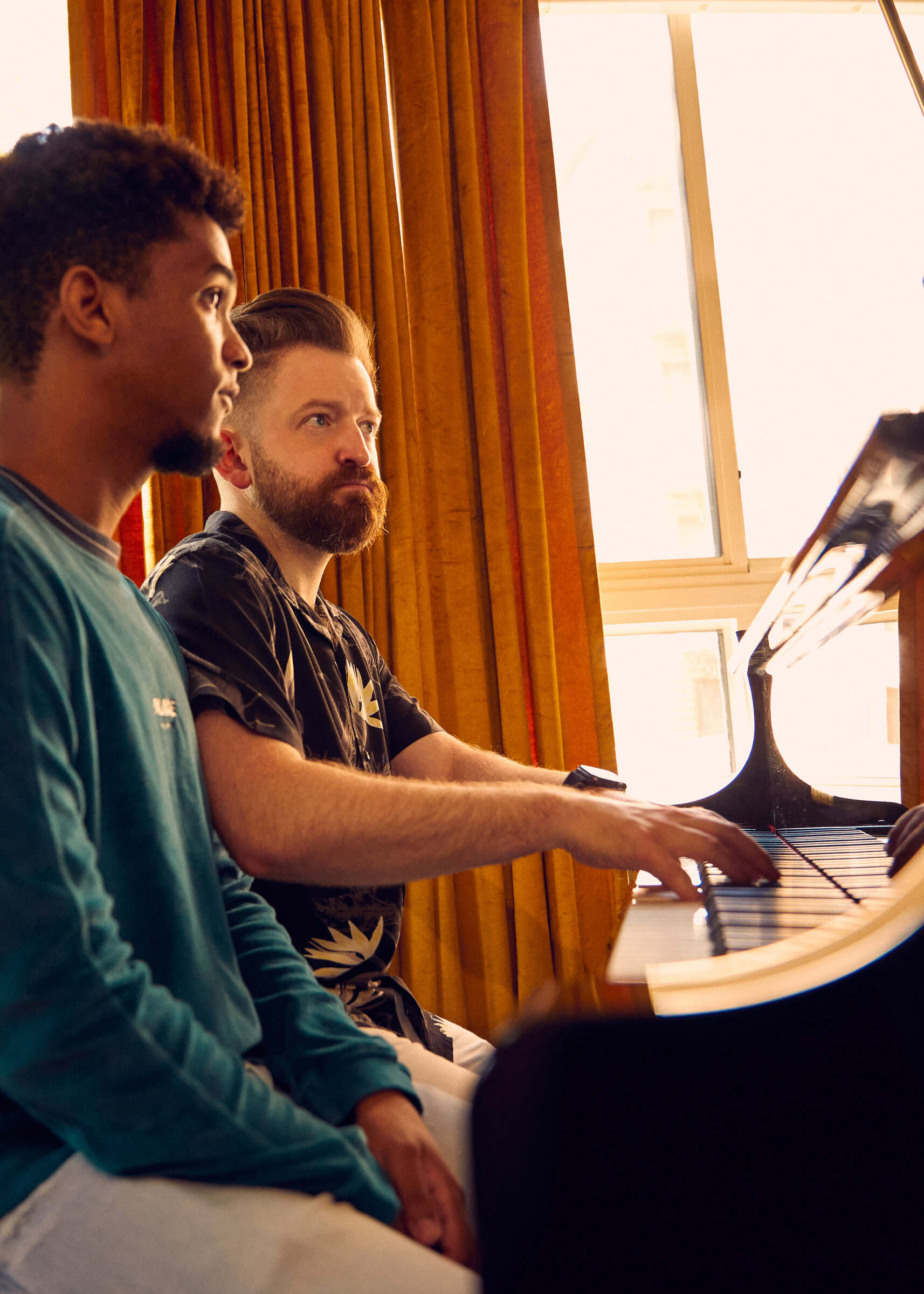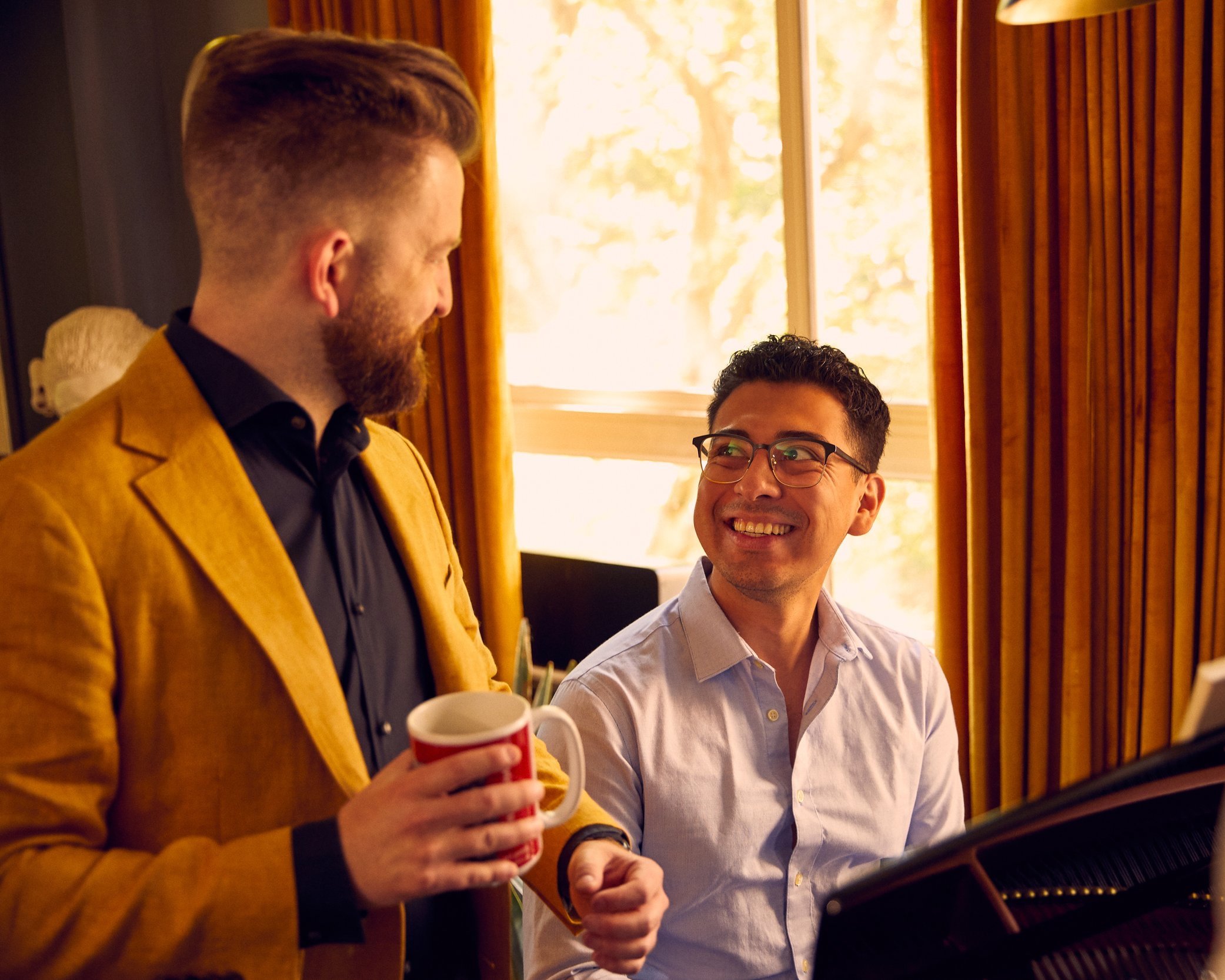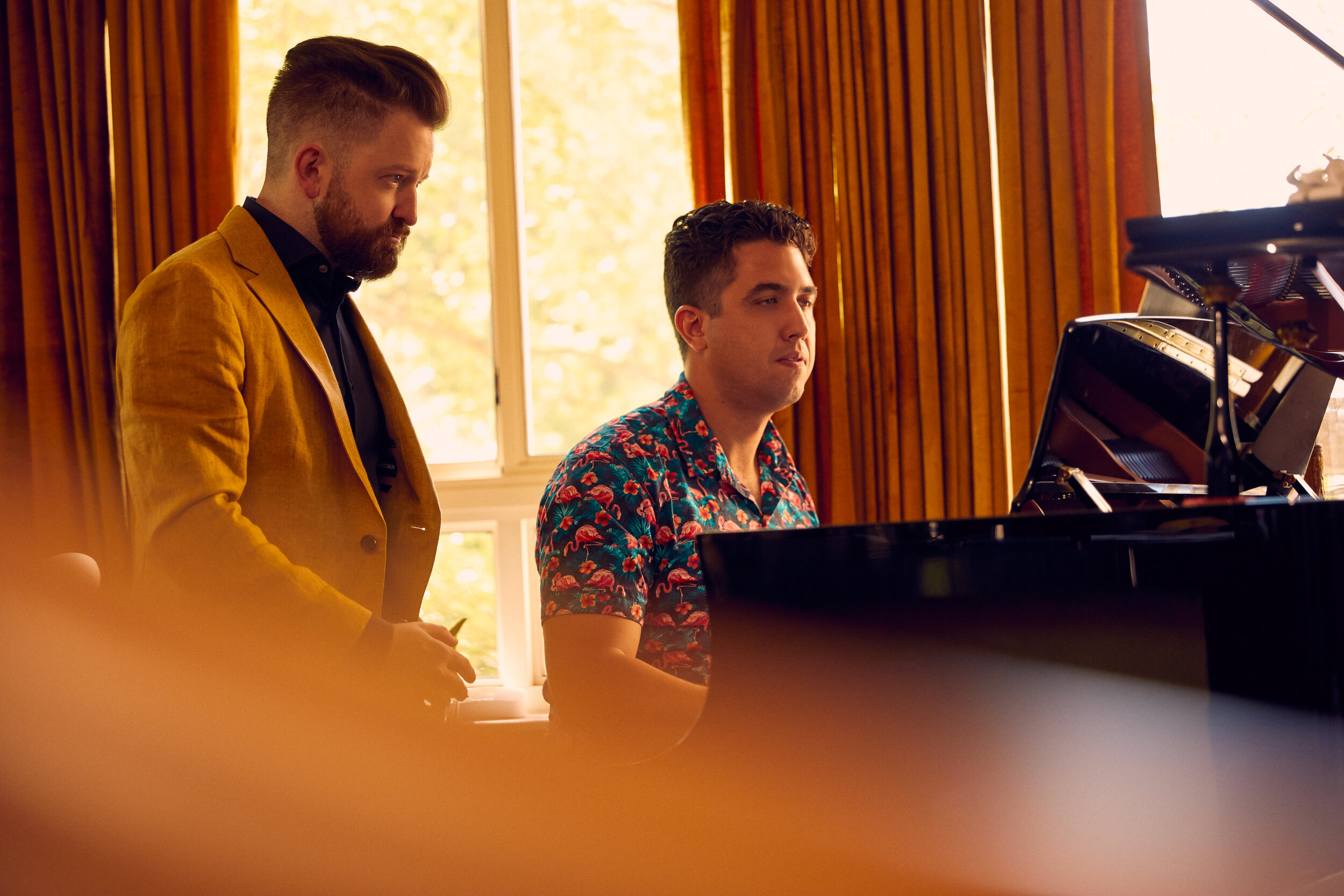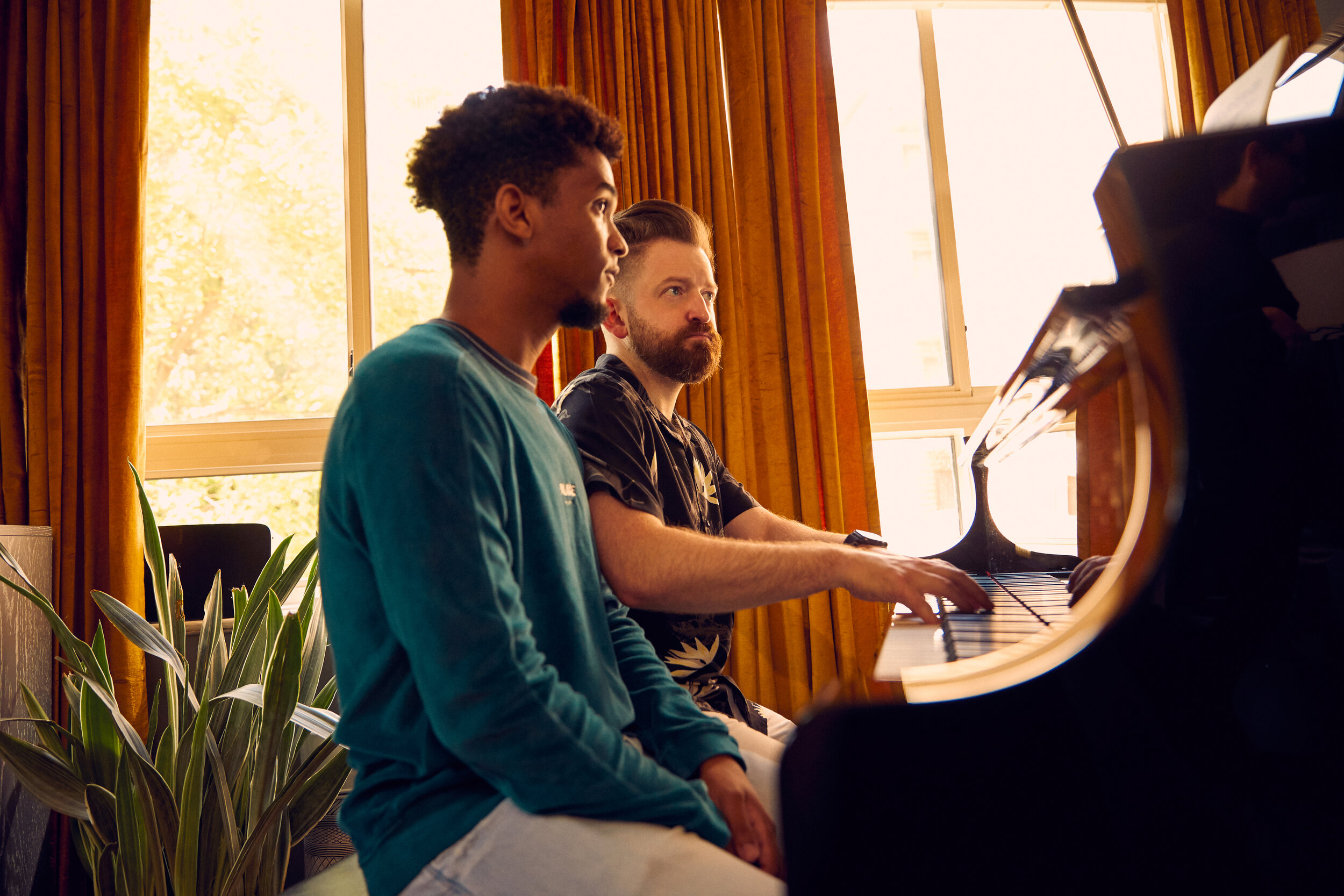
Sustainable education
Lessons focus on the total growth needs of every individual student. Piano Lessons, Musicology Lessons, and Composition Lessons are tailored to the needs and strengths of the students enrolled in the course of study.
For many people, being in a private course of study can be a little jarring: classroom instruction with dozens of others is more structured, with set times for each subject, and a propensity to teach down the middle. If a student happens to be very advanced in theory, they have to sit through the full thirty minutes of theory instruction in a classroom setting. If the same student needs an hour on literature studies, they are only given the allotted thirty minutes of instruction in the classroom setting.
Being in private instruction means having an individual curriculum, where the teacher is teaching to where you currently reside within the spectrum of the subject areas being studied. This may be a bit freer in form, but it is much more tailored to the needs of the student.
Studio instruction is particularly concerned with instilling consistent and sustainable technical mastery in students. As such, proficiency and technical students are challenged to learn to play not just in correct time and expression, but also in the correct physical posture.

Studio quarterly Tuition Rates
for 2026
The studio’s quarterly tuition rate is
$1200.00.
QUARTERS ARE THREE CALENDAR MONTHS. THIS WORKS OUT TO ABOUT $400 PER MONTH.
THE STUDIO’S LESSON RATE IS $106.00 FOR EACH HOUR & FIFTEEN LESSON.
This is the lesson rate used to calculate Quarterly Tuition.
THE STUDIO’S QUARTERLY FEE IS $34.00.
THIS AMOUNT IS ALREADY INCLUDED IN YOUR QUARTERLY TUITION RATE.
This fee is assessed to help cover supplies, materials, cleaning, and tuning which allow the studio to remain in good working order.
What does this include
Lessons are 1 hour and fifteen minutes each. Lessons are given every week indefinitely while the student remains actively enrolled except for times of studio closure as outlined below.
How the Studio BillS
The studio bills tuition on a quarterly basis. This means students are billed every three months, or four times per calendar year. Lessons are one hour and fifteen minutes in length, occur on a fixed day and time in the studio calendar, and occur once per week.
When the Studio Bills
The Studio bills students by the quarter, with three months comprising a quarter.
Spring Quarter Tuition is due by February 1st.
Summer Quarter Tuition is due by May 1st.
Fall Quarter Tuition is due by August 1st.
Winter Quarter Tuition is due by November 1st.
How bills are calculated
The studio teaches 44 weeks per year, and is closed for 8 weeks throughout the year at various times, some fixed, some floating. Tuition is calculated by multiplying the lesson rate by 44 weeks, dividing this by four, and adding the quarterly studio fee. Studio tuition is a fixed rate, with no deduction given during holiday times as these 8 weeks have already been withheld from the tuition calculation.
CAN I ENROLL Midway in a quareter?
Yes you can! Students wishing to matriculate into the studio mid-quarter will be billed a pro-rated amount for the lessons through the end of the present quarter. It’s important to note: if you enroll with one month or less to go to the next quarter, the you will be billed at the time of admission for the prorated last month of the present quarter plus the next quarter together.
at what times can i take my lessons?
There is, generally speaking, a waiting list for after-work slots. These slots are defined as lessons with start times of around 5pm to 8pm Mondays through Thursdays. These are the most popular times for students to take lessons, and even within the current studio roster, there are usually students who are in the queue to move into a weeknight slot if it should come available. It’s important to know that the studio generally doesn’t have after-work time slots available immediately, and that a first-come, first-serve policy is in effect.
As to the studio’s general time frames in which it offers lessons, students cannot generally commence their lessons any earlier than 10am and cannot commence lessons any later than 8:00pm. The studio teaches Sunday through Thursday, and is off Fridays and Saturdays. No lessons, make up or regularly scheduled, are allowed during Fridays and Saturdays.
When the studio is closed
The studio closes for 8 weeks per year. The studio is closed for 1 week at Thanksgiving, 2 weeks at Christmas / New Year, with 5 additional floating weeks to be determined. Your tuition has been calculated to withhold these 8 weeks; as such, the tuition is consistent across the calendar year. No deduction is given during weeks when the studio closes as these 8 weeks have already been withheld from the tuition calculation.
DO I NEED AN INSTRUMENT AT HOME?
The studio’s curriculum model requires a student to have consistent access to an instrument on which they can practice. This can be an at home instrument or an instrument associated with a college or university that the student is able to utilize freely and frequently.
The curriculum is predicated on the idea that students do the metacognitive learning process during their independent practice time and then bring their breakthroughs and their struggles to their lessons so that instruction can be dedicated to the facilitation of their progression through the material.
Lesson time cannot be a substitute for the metacognitive process that all students will need to do to gain control of the subject; a teacher simply giving answers and the student copying the teacher is not a learning model. Lessons are for the facilitation of the metacognitive work the student has done throughout the week.
HOW DOES THE STUDIO HANDLE CREDITS?
Should the studio need to close unexpectedly, a make lesson or a credit will be offered. Credits are applied and will be received at the turn of the next quarter. So, for instance, if a credit is issued in March during the Spring Quarter, the Credit will be applied on May 1st at the start of the Summer Quarter.
For a full list of policies, please scroll below to see
the Studio Statement of Policies for 2026
Please note: lessons are conducted in person or remotely.
The instructor does not travel to student’s homes for their lessons under any circumstances.
Statement of policies

2026 Statement of Policies
Effective Feb 2026 to Jan 2027
PHILOSOPHY, CURRICULUMS, & OBJECTIVES
PHILOSOPHY & EDUCATIONAL GOALS
The Studio utilizes the European Classical tradition of building a holistic and supportive musical community of learners, founded in a sustainable curriculum of technique, musicology, and literature studies.
CURRICULUM LEVELS
The musical curriculum must first instill basic proficiency in the core areas of reading, playing, rehearsing, and rhythm; secondly, instill a sustainable, considered technical mastery; and finally, develop a unique and expressive interpretation that fully incorporates the whole musician.
Matriculation Lecture: All matriculating students must complete the Matriculation Lecture, a small discussion course which covers problem solving, technique, history, and musical theory. This lecture is designed to prime the matriculating student’s understanding and provide a base from which further technical, physical, and musical education can be developed. This course will be administered during Studio Lessons until completion, at which point the student will proceed into the curriculum studies required.
Proficiency Studies: Proficiency level students are at the beginning of their studies, or lack the sufficiency due to time or inexperience to warrant a more technical curriculum.
Technical Studies: Technical studies are for the student who is proficient but requires technical refinement, exposure to literature, and technically integrated theoretical training.
Professional Studies: Professional Studies engage the proficient and technically masterful student in deeper, expressive musical approaches to develop an artistic, expressive, and individual musical performance at a professional level.
STUDIO OBJECTIVES
The Studio pursues some very specific objectives for its students:
Integrity: It is fundamentally essential that each step along the path to any musical objective be fully completed. The work is cummulative, and will suffer if any one step is not fully completed.
Responsibility: Students commit to taking responsibility for their studies by their thoroughness. The Studio offers a deep dive into musical learning, and students are expected to embrace and integrate this in their studies through their own reflexive, at-will integration fo the knowledge.
Self-Sustainment: As with any course of education, the Studio seeks to make independent thinkers who can musically exist past their time in the Studio. The education is meant to be for-life.
ACADEMIC EXPECTATIONS
STUDENTS’ CODE: I am committed to being respectful to myself and to my instructor. I am committed to my studies, my betterment, and the success of my peers to the best of my abilities. My time in the Studio is limited; I will make the most of it through my hard work, preparation, and enthusiasm. The Studio is grounded in a love of music; I will embrace this commitment in my Studio life.
GENERAL: Lessons cover practical, theoretical, musicological / conceptual instruction to be determined by the instructor. Adequate practice time is expected of each student. Assignments should be completed outside of studio time: guided practicing is not a productive use of Studio time. In these situations, the instructor may choose to engage in an extended conceptual lesson, or the instructor may conclude the lesson early and send the student home.
GRADING, LITERATURE, ASSIGNMENTS: All students are graded and monitored on an individual curriculum and will be contingent upon reasonable understandings of the student’s circumstances and needs. The Studio will give a classical education to its students. Foundational literature must be mastered, but seeking out music that is particularly interesting to individual taste is encouraged. Technical students will be assigned Weekly Assignments to develop sight-reading skills and hone individual musical technical skills. These works must be completed in the span of a week and graded.
PRACTICE & PHYSICAL REQUIREMENTS: Students should commit to practice the piano every day, even if this is only for ten or fifteen minutes. Practice strategies are fundamentally important, and will be discussed frequently with students as their curriculum needs evolve. Students will be given various physical exercises to perform that will assist in the strengthening and development of task-specific muscles involved in the playing of piano. Students with demonstrated motor-skill issues will be refered to physical therapists to rectify the situation.
OUTSIDE RESOURCES: The Studio encourages students to do research outside of the instruction they receive, but it is expected that students will defer to the instructor’s prerogatives if the information conflicts with studio instruction. This is particularly important when discussing misleading or factually incorrect information available on YouTube and Mass Media.
RECITALS: ALL Students will be expected to participate in the recitals or studio salon evenings offered by the Studio. These works must be performed from memory. For exceptional students, the instructor may require a multi-movement work, several works, or sight reading.
BILLING & FINANCIAL POLICIES 2026
QUARTERLY TUITION: $1200
RATES, FEES, & FINANCIAL OBLIGATIONS
General: The Studio bills quarterly at the following intervals:
SPRING QUARTER IS DUE FEBRUARY 1ST.
SUMMER QUARTER IS DUE MAY 1ST.
FALL QUARTER IS DUE AUGUST 1ST.
WINTER QUARTER IS DUE NOVERMBER 1ST.
Policies & Procedures: Tuition is due by the 1st of each quarter. All payments made after the 1st day of the first calendar month of each quarter are considered late, and subject to the late fee. Lessons are once a week, one hour and fifteen minutes in length, a fixed day & time in the Studio Calendar. Students matriculating mid-quarter will be billed a prorated tuition to cover lessons until the new quarter begins; if the matriculation is one month before the new quarter, the one month prorated plus the following quarter will be billed at the time of admission.
Calculation: The Studio teaches 44 weeks per year and is closed 8 weeks of the year. The Studio is closed for 1 week at Thanksgiving, 2 weeks at Christmas / New Year, and an 5 additional weeks to be determined. Quarterly Lesson Totals are calculated by multiplying 44 lessons/year divided by 4 quarters, plus the fixed quarterly fee. No deduction is given during holiday closures as these weeks have already been withheld in the quarterly tuition calculation. Itemized rates below.
Fees: The quarterly fee of $40.00 is for the upkeed and maintenance of the studio. There is a late payment fee of $50.00, which is assessed to any unpaid bills after the 1st calendar day of each quarter.
ITEMIZED RATES 2024
WEEKLY LESSON (1 HOUR AND 15 MINUTES) $106.00 QUARTERLY FEE $34.00 LATE FEE $50.00
ACCEPTED PAYMENT METHODS
Studio V’s preferred payment methods are Venmo or Zelle. Zelle is an interbank wire service that is free of charge and offered at almost all major financial institutions.
Credit Cards can be used through Venmo. Be sure to read Venmo’s terms and conditions regarding credit card payments through its service.
Checks or Cash are also welcome. A $50 returned check fee will be assessed for all returned checks.
STUDIO SCHEDULING POLICIES 2026
GUIDELINES
Make-Up Lessons: students enrolled in the studio take lessons at a fixed day and time once a week. This is their weekly time slot (i.e. wednesdays at 12:15 pm). A make-up lesson is a lesson offered as a substitute for a time slot that needs to be missed by the student for any reason.
All scheduling is confined to the quarter: scheduling issues not resolved within the quarter in which they occur are considered closed or forfeited. No scheduling issue of any kind may transfer between the different quarters of the billing year. Within the quarter, these guidelines apply:
Make-Up Lessons Are Strictly Contingent upon Studio Availability: while the Studio tries to make up lessons that meet the conditions below, no make up lesson can be guaranteed, and further, students understand that the studio’s first obligation is to regularly scheduled lessons. Missed Make-Up lessons are not eligible for a new Make-Up lesson.
Make-Up Lessons Require 72 Hours Notice: make-up lessons must be requested with at least 72 hours notice to the start of the scheduled lesson; make-up lessons cannot be offered with less than 72 hours notice. SIckness: if a student is sick, they may elect to have a remote lesson at home while they quarantine; however, make-up lessons cannot be offered for sickness with less than 72 hours notice.
Missed Lessons May Not Be Deducted from the Following Quarterly Tuition: lessons that have been missed for any reason from the current quarter and have not been made up may not be deducted from the following quarter’s tuition.
Lesson Credits & Reimbursements: if the instructor must cancel a lesson for any reason, a make-up will be scheduled, and if this is not possible, the lesson will be reimbursed back to the student. Reimbursements or refunds for any reason shall occur at the change of the quarter or sooner, as able.
Quarterly Tuition Minimum Payment: students may not pay less than 85% of their quarterly tuition and retain their space in the studio calendar.
Excessive Make-Ups: Students should prioritize making their scheduled lessons. The studio will be unlikely to accommodate frequent make-up requests. It is strongly advised that students settle reschedule requests at the beginning of each new quarter to prevent missed lesson time in studio.
Winter Make-Up Blackout Period: during the months of November and December, make up lessons will not be offered. Any needed reschedules for the months of November and December must be made by October 31st.
Time-Slot Rescheduling: Students who need to switch their weekly lesson times to a new fixed time-slot should notify the instructor immediately.
Withdrawal from the Studio: students who need to withdraw from lessons are free to do so at any time without additional payment or fee. Lessons that have already been scheduled are not eligible for reimbursement or refund, with scheduling being done by the quarter.
Scheduling at the Time of the Quarter Transition: Students are encouraged to bring their calendars to the studio at the start of a new quarter to work out needed reschedules in advance. This allows the studio to plan in advance; if rescheduling cannot be worked out, the student may take a deduction on their tuition after consulting with the instructor, but may not pay less than the 85% quarterly tuition minimum.
Successful compliance with these policies is strictly the discretion of the instructor.
